Search
Recent comments
- waste of euros....
1 day 10 hours ago - macron l'idiot....
1 day 12 hours ago - pomp and charity....
1 day 12 hours ago - overshoot days....
1 day 12 hours ago - "americamaidan"
1 day 12 hours ago - australia sux....
1 day 13 hours ago - the little children....
1 day 13 hours ago - delayed food....
1 day 20 hours ago - free expression....
1 day 21 hours ago - macrolympicus....
1 day 22 hours ago
Democracy Links
Member's Off-site Blogs
at the trough .....
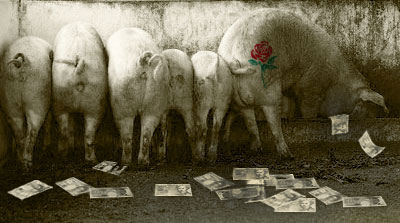
These are the notes for a talk I am doing on the corruption that is capitalism on Thursday 21 November at 6 pm in room W108 at Baldessin Building ANU in Canberra.
John Passant
Comrades and Colleagues,
Today I am going to start off looking at some of the egregious examples of corruption, mainly but not solely in Australia. Then I will look at corruption in the context of capitalism and argue corruption is a natural outcome of capitalism.
It is not ‘a few bad apples’ who are corrupt but people under the influence of competition, economic and political, that drives them to cheat for more money. But I am also going to make a wider argument, that capitalism is itself corrupt, i.e. that that ‘more money’ I mentioned comes from the exploitation of workers. Capitalism exploits workers by paying them less than the value of the goods and services they produce and that is the real underlying source of the wealth that business compete over and which businesses, politicians, sportspeople and others fight over. That fight includes cheating or corruption as one means of redistributing the wealth workers produce.
Ok so let’s start off with the fun bit. I am going to put a few photos up on the screen (I hope) and want you to identify who they are and their relevance to today’s talk. Sport is always a good place to start any conversation. Who is this?
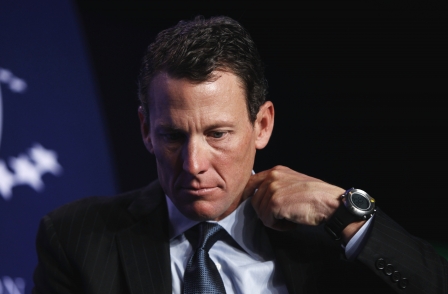
Yes. It is Lance Armstrong, admitting to Oprah he and his team were drug cheats. Lance won 7 Tours de France, the ultimate competition in cycling. What drove him to cheat? Well, there was the personal enrichment. But there is more. Armstrong was part of a team that is a business and professional cycling is a business. It was win at all costs just as it is in all businesses. And of course they thought all the other teams were cheating so they too had to do it. Did you know, now that there are more stringent drug tests in cycling, the winning times are much slower than under the previous Tours of recent history?

This is Trevor Flugge. He was head of the Australian Wheat Board which bribed Iraq’s Saddam Hussein to sell wheat to his regime in exchange for oil, contrary to UN sanctions on Iraq and Australian law. They paid $290 million to do this. The Wheat Board was a single desk, which meant it bought wheat from Australian farmers and was the only body who could export it. Australian farmers benefited from this bribery. It was just business.
Flugge suffered no criminal or civil prosecutions and indeed went on to buy a company which won a government contract to re-house refugees in Newcastle. It was a complete disgrace, housing refugees in sub-standard housing over many years.
There is one thing you’ll see in many of these corruption examples, the close links, indeed a revolving door between business, government and politicians. Here’s a photo of the revolving door of powerful politician to convicted fraudster to lobbyist. Who is this?

His name is Brian Burke, former Labor Premier of Western Australia. He spent 7 months in jail for rorting travel expenses. He ran WA inc. His unconvicted crimes including making decisions beneficial to companies who had made large donations to the ALP.
After jail, he became a lobbyist and one of the most powerful backroom men in the ALP in WA. Here is a photo of another powerful ALP man. Any guesses who this might be?

Of course. This is Eddie Obeid, currently before 3 separate Independent Commission Against Corruption investigations in New South Wales. He was one of, if not the, most powerful man in the ALP right and hence the ALP in NSW. He made and unmade Premiers. Other former Labor Ministers are now implicated in the scandals.
There’s the ongoing charges against former ALP parliamentarian Craig Thomson for using Health Services Union funds to buy prostitutes, and the like.
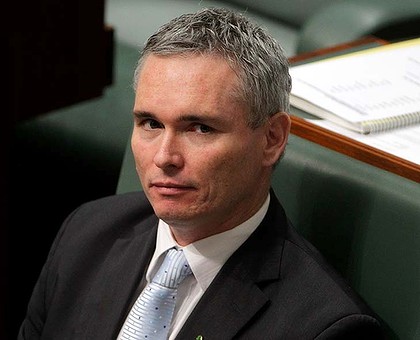
There are other scandals involving unionists like the former head of the Health Services Union and former ALP National president Michael Williamson ($1m and still counting ripped off from union members).
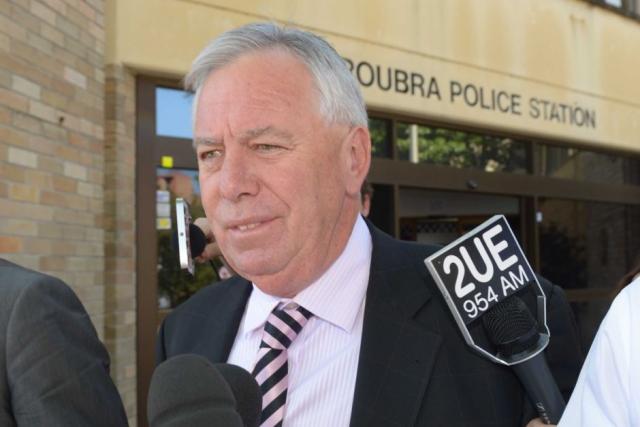
Let’s look at federal politicians in a little more detail. One quarter of all federal politicians paid back over-claimed expenses in a four year period. Only one, Peter Slipper, has been charged..

Now Minister for Agriculture, Barnaby Joyce went to a mate’s wedding, Gina Rinehart flew over for his election night party, Gina Rinehart funded a trip for him and 2 other Liberal politicians to India to help sell Rinehart, he went to the Rugby League State of Origin and grand final. All on the taxpayer (and in the case of the India trip the cost of coming back on the taxpayer). Here is a photo of Barnaby hard at work at the wedding of his mate, shock jock Michael Smith.

But it isn’t only Barnaby. There’s George Brandis at the same wedding, there’s Julie Bishop flying to India courtesy of Rinehart, and on and on it goes. Of course there’s also this man.
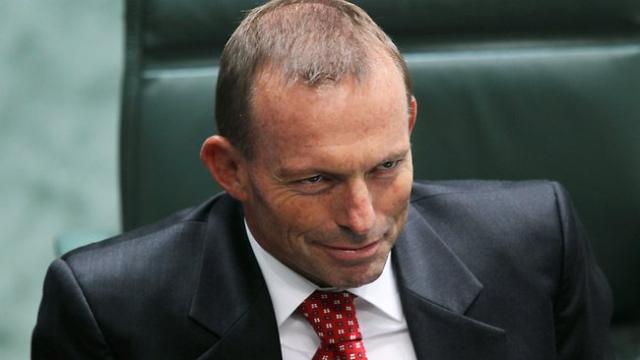
Tony Abbott claimed travel expenses for his tour around Australia flogging his book, Battlelines. He claimed expenses for attending his good mate Peter Slipper’s wedding. The same Peter Slipper now charged with offences for allegedly abusing taxi vouchers for a tour of Canberra wineries. Abbott also claimed expenses for a fun run. Anyone spot a pattern here?
There are no police investigations, no raids on the offices of those politicians involved. On the other hand when the CFMEU tried to enforce safety standards on Grocon at Myer Emporium 1000 police were on hand to attack the picket and help scabs to get in.
Why the different treatment? Well, police reflect the class nature of society. They are an arm of the capitalist state. Their enemy is workers and others not part of the one percent.
But there is something else too. What is missing is mass radical mobilisations around any major issue let alone for political transparency and honesty. What is missing is an engaged working class citizenry. Instead we have major sections of the working class disengaged and disillusioned. The union leadership bears a major part of the responsibility for this with its embrace of Labor’s neoliberalism over the last 4 decades and capitulation to the Liberals’ neoliberalism.
It is also true that there has been no police investigation into parliamentary rorts because Labor have not pushed the issue. Why not? Because they are up to their eyeballs in the perks and rorts too.
As the discussion of Trevor Flugge shows, it isn’t just pollies and ex-pollies who rort the system. Business does it too, driven by the need to best their competitors by fair means or foul.
Competition knows no laws but its own. The one law is beat your opponents and make more profits anyway you can.
Who is this?
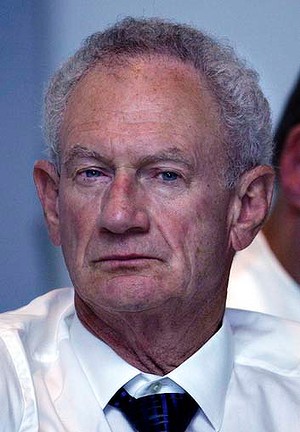
It is Wal King, former head of building firm, Leighton Constructions. Here is a little meme on his retirement which gives an idea of his wealth.
Leighton Holdings is an international company and Fairfax investigations uncovered company files which ‘expose plans to pay alleged multimillion-dollar kickbacks in Iraq, Indonesia, Malaysia and elsewhere, along with other serious corporate misconduct.’
‘Among the most explosive of the company files is a memo handwritten on November 23, 2010, by then acting CEO David Stewart.
‘The memo says Leighton International’s managing director, David Savage, revealed during a meeting that he and Wal King knew a $42 million kickback was paid to a company in Monaco nominated by Iraqi officials who selected Leighton for a $750 million oil pipeline contract.
“I asked did Wal K approve this? And he said yes,” Mr Stewart’s memo says.’
Wal King is being investigated. He won’t be alone. He won’t be a one-off among the bourgeoisie. He is not the one bad apple in Australian capitalism. What drove King and Leightons to allegedly bribe and have plans to bribe people? Because it wins them the contracts and profits they want and need to survive at the expense of their competitors. That drive exists in every company. Profit is its raison d’etre.
Do you know who many Australian business people have been investigated let alone convicted in the last 13 years for bribery? According to the OECD exactly none. So apparently Wal King is alone, and his case has only come to light after investigations by Fairfax journalists, not ASIC. BTW, he hasn’t yet been charged with anything. As the Paul Hogan tax case shows if you have bottomless pockets you can often exhaust investigations and prosecutions.
Australia is not unique in this regard.
The immediate superficial cause of or perhaps trigger for the GFC was the bundling together of housing loans and their on sale to investors. But what the clever banks did was mix in NINJA loans (no income, no jobs) with other more seemingly reliable housing loans to hide their inherent instability. Some of you may have heard about the settlement that the big US bank JP Morgan Chase reached recently with the US Justice Department.
The Bank has agreed to pay $13 billion after acknowledging it misled investors about the quality of its mortgage-backed securities. .
Before we get too carried away, the havoc the GFC wreaked on US workers and European workers is immeasurable. Unemployment in the US hit double digit figures and is still high. In Southern Europe youth unemployment is over 50% in some countries. Wages are lower now than before the GFC in real and in some cases absolute terms in much of the US and Southern Europe.
It was and is US workers who pay for the bank bailouts with jobs losses, wage cuts or loss of meagre social services. And $13 billion is only 40% of JP Morgan’s $21 bn in profits in 2012, which was reduced by $23 bn set aside as reserves for just such a settlement and other costs.
Has any Wall Street executive been jailed for their crimes? No, not one.
By contrast there have been, as of 17 September 2013, 7765 Occupy arrests. Occupy started off as the Occupy Wall St Movement in response to the crooks of Wall St and the consequences of their actions and government bailout and became an international movement against the one percent.
The picture I am trying to paint is of a system driven by the need to make a profit and reinvest that profit in more means to make more profit. It is also a system which paints success in terms of money and how much you earn. Now for most working class people they will remain working class people on wages that are enough to provide them with the basics of life. So some working class people might try to cheat the system to get a bit of extra money. The system cracks down on them.
Union leaders and Labor politicians are not members of the working class. They are better paid than workers. The role of union bureaucrats is to retail the price of workers’ labour power to the bosses. The role of Labor parliamentarians in government is to manage capitalism, in essence how to make the Gina Rineharts and Wal Kings of the world more profitable.
Mixing in the circles of the bourgeoisie and seeing the personal rewards the bosses get tempts some of them to cheat to mirror those rewards over and above the rewards they receive for their intermediate role in capitalism.
For the bourgeoisie the aim is not necessarily personal enrichment. It is to make profit, to make more profit, the ultimate driver of capitalism.
Let’s now look at how the system itself is corrupt.
There is one question to ask. What is it that the corrupt business people, politicians, union officials and others are actually fighting over, are actually stealing? Where do the profits, the funds in union accounts, the politicians ‘expense payments fund come from?
In a nutshell the wealth they are fighting over through competition, whether legally or illegally, is the wealth we workers create. So it is more than that some bad apples corruptly win profits or improve their financial position. The capitalist system itself is corrupt. It exploits workers. What does that mean?
Well in looking at where profit comes from, we Marxists argue that it is labour which is the source of all value or capitalist wealth. How so? Not to go into too much detail, what is it that 2 totally different commodities have in common? When they exchange on the market? Labour.
When we work we sell something to our employer for a wage, a price. This something is a commodity and is paid at its value, that is the amount needed to provide for its production (food, clothes, housing, education, transport), reproduction (the kids), and an amount historically and morally determined.
What does capital buy when it employs us? Is it our labour? No, because that happens once we are put to work. What the boss buys is our labour power, our capacity to work. They buy it at a rate around its value, the amount needed for us and our kids to survive OK.
Let’s say that is $1500 a week. Yet what happens when we work for the boss. Let’s say we make commodities for sale on the market and we make say $2500 of commodities. That extra value, that extra $1000 we create is our unpaid labour. Now extrapolate that across society and for all labour used to make commodities (goods and services) for the market. Millions of workers in Australia are beavering away making what Marx called surplus value for the boss because we are paid less than the value we create for the boss. The boss ends up with this surplus value because they own the factories, the land, the machines, our labour.
Surplus value in the market and afterwards becomes profit, interest in the hands of banks, dividends, rent in the hands of landlords, wages for us and tax for the capitalist state. It is that surplus value that the corrupt companies and individuals fight over. All they are doing is using methods to win their share of surplus value greater than so-called fair competition or fair work might produce or their contribution in capitalist terms might justify. Thus company bribery for example both reflects competition and undermines it. This is because it reflects the drive to make a profit but does so on an unequal playing field (assuming that only some companies are able or willing to bribe).
In other words capitalism exists by exploiting workers, i.e. by paying them less than the value they produce.
There is another sense in which capitalism is corrupt, and that is in who gets the rewards. Over the last 40 years, since the global collapse in profit rates and the rise of neoliberalism, inequality in almost all developed countries, including Australia, has increased. In Australia for example 12.8% of people live in poverty, and that includes over 17% of all children.
Australia is a very rich country in which no one should live in poverty. The problem is intractable and getting worse. But to fix up poverty we’d have to take a little bit off those who live off our work. The logic of capital accumulation will not allow that.
So to summarise, rorters on the system either reflect the drive for personal enrichment or profit that the system gives number one priority too. But the system itself is corrupt in the sense that it only exists by exploiting workers and not rewarding the working class for the value it produces.
The solution to corruption is a democratic society in which production is organised by the vast majority of people, we workers, the people who produce the wealth and will do so for the benefit of that vast majority, that is to satisfy human need, not to make a profit. That my friends is socialism.
- By John Richardson at 25 Nov 2013 - 8:55am
- John Richardson's blog
- Login or register to post comments
wrong person of interest...
I would not have placed Craig Thomson in this basket... This sad case is still going on and from a massive half a million dollar claimed to have been rorted, we are looking now at a couple of ice-cream being bought on the Union Card... Recently the prosecution has demanded for a mediation (rather than a court case) which means more or less that the case against Thomson is very weak. It would have been more appropriate to use Jackson's picture as that of the Jacksonville saga....
no deal (jacksonville 63) ...
In a Melbourne court yesterday, the shambolic prosecution case against Craig Thomson toppled and teetered even closer to total collapse. Peter Wicks reports.
YESTERDAY, in the Melbourne Magistrates Court, Craig Thomson was left scratching his head.
In what has been the latest bizarre event in the whole saga surrounding the former MP, the prosecution in the criminal case have gone all schizophrenic on us, offering one thing and doing another.
Sources close to the case have told IA of the prosecution approaching Thomson with an offer they likely hoped would be too good ‒ or Thomson too broke ‒ to refuse.
An offer was reportedly put to Thomson's to plead guilty to one single new lesser charge of ‘gaining advantage by deception’ and all of the other charges would be dropped.
The advantage to Thomson would be he would no longer have to spend a king's ransom defending the 173 charges that, apparently, are no longer important in the eyes of the prosecution.
The advantage to the prosecution being that as their case crumbles due to a lack of any evidence to support their charges, they have at least saved some face by being able to say they laid a charge after Thomson made a deal.
Thomson refused the offer deciding instead to pursue justice through the court system so the public is left with no lingering questions about his guilt or innocence.
In a shock move, the prosecution then decided to lay another 50 charges on Thomson.
http://www.independentaustralia.net/politics/politics-display/jacksonville-63-the-doomed-case-against-craig-thomson,5926
we are all become whores .....
America is a country that is now utterly divided when it comes to its society, its economy, its politics. There are definitely two Americas. I live in one, on one block in Baltimore that is part of the viable America, the America that is connected to its own economy, where there is a plausible future for the people born into it. About 20 blocks away is another America entirely. It's astonishing how little we have to do with each other, and yet we are living in such proximity.
There's no barbed wire around West Baltimore or around East Baltimore, around Pimlico, the areas in my city that have been utterly divorced from the American experience that I know. But there might as well be. We've somehow managed to march on to two separate futures and I think you're seeing this more and more in the west. I don't think it's unique to America.
I think we've perfected a lot of the tragedy and we're getting there faster than a lot of other places that may be a little more reasoned, but my dangerous idea kind of involves this fellow who got left by the wayside in the 20th century and seemed to be almost the butt end of the joke of the 20th century; a fellow named Karl Marx.
I'm not a Marxist in the sense that I don't think Marxism has a very specific clinical answer to what ails us economically. I think Marx was a much better diagnostician than he was a clinician. He was good at figuring out what was wrong or what could be wrong with capitalism if it wasn't attended to and much less credible when it comes to how you might solve that.
You know if you've read Capital or if you've got the Cliff Notes, you know that his imaginings of how classical Marxism – of how his logic would work when applied – kind of devolve into such nonsense as the withering away of the state and platitudes like that. But he was really sharp about what goes wrong when capital wins unequivocally, when it gets everything it asks for.
That may be the ultimate tragedy of capitalism in our time, that it has achieved its dominance without regard to a social compact, without being connected to any other metric for human progress.
We understand profit. In my country we measure things by profit. We listen to the Wall Street analysts. They tell us what we're supposed to do every quarter. The quarterly report is God. Turn to face God. Turn to face Mecca, you know. Did you make your number? Did you not make your number? Do you want your bonus? Do you not want your bonus?
And that notion that capital is the metric, that profit is the metric by which we're going to measure the health of our society is one of the fundamental mistakes of the last 30 years. I would date it in my country to about 1980 exactly, and it has triumphed.
Capitalism stomped the hell out of Marxism by the end of the 20th century and was predominant in all respects, but the great irony of it is that the only thing that actually works is not ideological, it is impure, has elements of both arguments and never actually achieves any kind of partisan or philosophical perfection.
It's pragmatic, it includes the best aspects of socialistic thought and of free-market capitalism and it works because we don't let it work entirely. And that's a hard idea to think – that there isn't one single silver bullet that gets us out of the mess we've dug for ourselves. But man, we've dug a mess.
After the second world war, the west emerged with the American economy coming out of its wartime extravagance, emerging as the best product. It was the best product. It worked the best. It was demonstrating its might not only in terms of what it did during the war but in terms of just how facile it was in creating mass wealth.
Plus, it provided a lot more freedom and was doing the one thing that guaranteed that the 20th century was going to be – and forgive the jingoistic sound of this – the American century.
It took a working class that had no discretionary income at the beginning of the century, which was working on subsistence wages. It turned it into a consumer class that not only had money to buy all the stuff that they needed to live but enough to buy a bunch of shit that they wanted but didn't need, and that was the engine that drove us.
It wasn't just that we could supply stuff, or that we had the factories or know-how or capital, it was that we created our own demand and started exporting that demand throughout the west. And the standard of living made it possible to manufacture stuff at an incredible rate and sell it.
And how did we do that? We did that by not giving in to either side. That was the new deal. That was the great society. That was all of that argument about collective bargaining and union wages and it was an argument that meant neither side gets to win.
Labour doesn't get to win all its arguments, capital doesn't get to. But it's in the tension, it's in the actual fight between the two, that capitalism actually becomes functional, that it becomes something that every stratum in society has a stake in, that they all share.
The unions actually mattered. The unions were part of the equation. It didn't matter that they won all the time, it didn't matter that they lost all the time, it just mattered that they had to win some of the time and they had to put up a fight and they had to argue for the demand and the equation and for the idea that workers were not worth less, they were worth more.
Ultimately we abandoned that and believed in the idea of trickle-down and the idea of the market economy and the market knows best, to the point where now libertarianism in my country is actually being taken seriously as an intelligent mode of political thought. It's astonishing to me. But it is. People are saying I don't need anything but my own ability to earn a profit. I'm not connected to society. I don't care how the road got built, I don't care where the firefighter comes from, I don't care who educates the kids other than my kids. I am me. It's the triumph of the self. I am me, hear me roar.
That we've gotten to this point is astonishing to me because basically in winning its victory, in seeing that Wall come down and seeing the former Stalinist state's journey towards our way of thinking in terms of markets or being vulnerable, you would have thought that we would have learned what works. Instead we've descended into what can only be described as greed. This is just greed. This is an inability to see that we're all connected, that the idea of two Americas is implausible, or two Australias, or two Spains or two Frances.
Societies are exactly what they sound like. If everybody is invested and if everyone just believes that they have "some", it doesn't mean that everybody's going to get the same amount. It doesn't mean there aren't going to be people who are the venture capitalists who stand to make the most. It's not each according to their needs or anything that is purely Marxist, but it is that everybody feels as if, if the society succeeds, I succeed, I don't get left behind. And there isn't a society in the west now, right now, that is able to sustain that for all of its population.
And so in my country you're seeing a horror show. You're seeing a retrenchment in terms of family income, you're seeing the abandonment of basic services, such as public education, functional public education. You're seeing the underclass hunted through an alleged war on dangerous drugs that is in fact merely a war on the poor and has turned us into the most incarcerative state in the history of mankind, in terms of the sheer numbers of people we've put in American prisons and the percentage of Americans we put into prisons. No other country on the face of the Earth jails people at the number and rate that we are.
We have become something other than what we claim for the American dream and all because of our inability to basically share, to even contemplate a socialist impulse.
Socialism is a dirty word in my country. I have to give that disclaimer at the beginning of every speech, "Oh by the way I'm not a Marxist you know". I lived through the 20th century. I don't believe that a state-run economy can be as viable as market capitalism in producing mass wealth. I don't.
I'm utterly committed to the idea that capitalism has to be the way we generate mass wealth in the coming century. That argument's over. But the idea that it's not going to be married to a social compact, that how you distribute the benefits of capitalism isn't going to include everyone in the society to a reasonable extent, that's astonishing to me.
And so capitalism is about to seize defeat from the jaws of victory all by its own hand. That's the astonishing end of this story, unless we reverse course. Unless we take into consideration, if not the remedies of Marx then the diagnosis, because he saw what would happen if capital triumphed unequivocally, if it got everything it wanted.
And one of the things that capital would want unequivocally and for certain is the diminishment of labour. They would want labour to be diminished because labour's a cost. And if labour is diminished, let's translate that: in human terms, it means human beings are worth less.
From this moment forward unless we reverse course, the average human being is worth less on planet Earth. Unless we take stock of the fact that maybe socialism and the socialist impulse has to be addressed again; it has to be married as it was married in the 1930s, the 1940s and even into the 1950s, to the engine that is capitalism.
Mistaking capitalism for a blueprint as to how to build a society strikes me as a really dangerous idea in a bad way. Capitalism is a remarkable engine again for producing wealth. It's a great tool to have in your toolbox if you're trying to build a society and have that society advance. You wouldn't want to go forward at this point without it. But it's not a blueprint for how to build the just society. There are other metrics besides that quarterly profit report.
The idea that the market will solve such things as environmental concerns, as our racial divides, as our class distinctions, our problems with educating and incorporating one generation of workers into the economy after the other when that economy is changing; the idea that the market is going to heed all of the human concerns and still maximise profit is juvenile. It's a juvenile notion and it's still being argued in my country passionately and we're going down the tubes. And it terrifies me because I'm astonished at how comfortable we are in absolving ourselves of what is basically a moral choice. Are we all in this together or are we all not?
If you watched the debacle that was, and is, the fight over something as basic as public health policy in my country over the last couple of years, imagine the ineffectiveness that Americans are going to offer the world when it comes to something really complicated like global warming. We can't even get healthcare for our citizens on a basic level. And the argument comes down to: "Goddamn this socialist president. Does he think I'm going to pay to keep other people healthy? It's socialism, motherfucker."
What do you think group health insurance is? You know you ask these guys, "Do you have group health insurance where you …?" "Oh yeah, I get …" you know, "my law firm …" So when you get sick you're able to afford the treatment.
The treatment comes because you have enough people in your law firm so you're able to get health insurance enough for them to stay healthy. So the actuarial tables work and all of you, when you do get sick, are able to have the resources there to get better because you're relying on the idea of the group. Yeah. And they nod their heads, and you go "Brother, that's socialism. You know it is."
And ... you know when you say, OK, we're going to do what we're doing for your law firm but we're going to do it for 300 million Americans and we're going to make it affordable for everybody that way. And yes, it means that you're going to be paying for the other guys in the society, the same way you pay for the other guys in the law firm … Their eyes glaze. You know they don't want to hear it. It's too much. Too much to contemplate the idea that the whole country might be actually connected.
So I'm astonished that at this late date I'm standing here and saying we might want to go back for this guy Marx that we were laughing at, if not for his prescriptions, then at least for his depiction of what is possible if you don't mitigate the authority of capitalism, if you don't embrace some other values for human endeavour.
And that's what The Wire was about basically, it was about people who were worth less and who were no longer necessary, as maybe 10 or 15% of my country is no longer necessary to the operation of the economy. It was about them trying to solve, for lack of a better term, an existential crisis. In their irrelevance, their economic irrelevance, they were nonetheless still on the ground occupying this place called Baltimore and they were going to have to endure somehow.
That's the great horror show. What are we going to do with all these people that we've managed to marginalise? It was kind of interesting when it was only race, when you could do this on the basis of people's racial fears and it was just the black and brown people in American cities who had the higher rates of unemployment and the higher rates of addiction and were marginalised and had the shitty school systems and the lack of opportunity.
And kind of interesting in this last recession to see the economy shrug and start to throw white middle-class people into the same boat, so that they became vulnerable to the drug war, say from methamphetamine, or they became unable to qualify for college loans. And all of a sudden a certain faith in the economic engine and the economic authority of Wall Street and market logic started to fall away from people. And they realised it's not just about race, it's about something even more terrifying. It's about class. Are you at the top of the wave or are you at the bottom?
So how does it get better? In 1932, it got better because they dealt the cards again and there was a communal logic that said nobody's going to get left behind. We're going to figure this out. We're going to get the banks open. From the depths of that depression a social compact was made between worker, between labour and capital that actually allowed people to have some hope.
We're either going to do that in some practical way when things get bad enough or we're going to keep going the way we're going, at which point there's going to be enough people standing on the outside of this mess that somebody's going to pick up a brick, because you know when people get to the end there's always the brick. I hope we go for the first option but I'm losing faith.
The other thing that was there in 1932 that isn't there now is that some element of the popular will could be expressed through the electoral process in my country.
The last job of capitalism – having won all the battles against labour, having acquired the ultimate authority, almost the ultimate moral authority over what's a good idea or what's not, or what's valued and what's not – the last journey for capital in my country has been to buy the electoral process, the one venue for reform that remained to Americans.
Right now capital has effectively purchased the government, and you witnessed it again with the healthcare debacle in terms of the $450m that was heaved into Congress, the most broken part of my government, in order that the popular will never actually emerged in any of that legislative process.
So I don't know what we do if we can't actually control the representative government that we claim will manifest the popular will. Even if we all start having the same sentiments that I'm arguing for now, I'm not sure we can effect them any more in the same way that we could at the rise of the Great Depression, so maybe it will be the brick. But I hope not.
David Simon is an American author and journalist and was the executive producer of The Wire. This is an edited extract of a talk delivered at the Festival of Dangerous Ideas in Sydney.
There are now two Americas - My country is a horror show